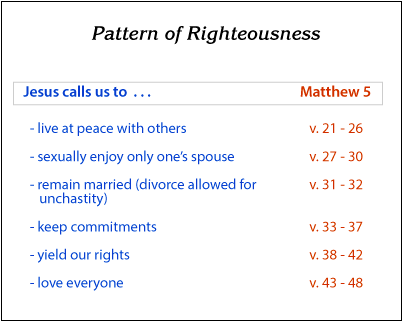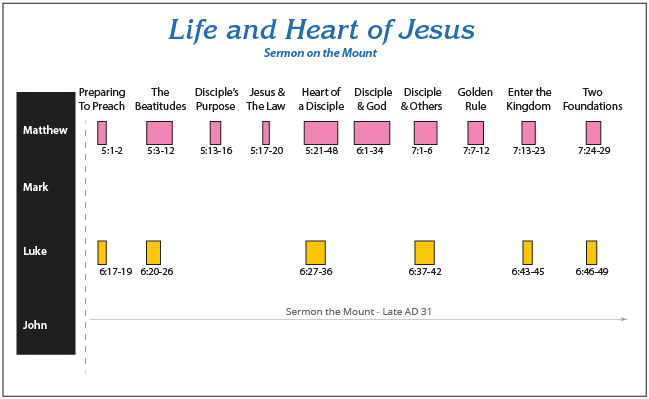Do you have a sense of right and wrong? Years ago a young engineer was asked by a business associate if he would approve of his girl friend being murdered. The young engineer answered with, “No!” Yet, this young engineer claimed that there were no moral absolutes by which he or we should live. So he was asked why he objected to his girl friend being murdered? Where did he get his concept of right and wrong? Where do we get our concept of right and wrong? Most of us get our concept of right and wrong from our culture. Most religious people get their concept of right and wrong or righteousness and evil from their society and their church, synagogue, or temple. Society has a great influence on us, and it affects even religious people. It affects what we believe. Some Christians allow their pastors to influence their understanding of right and wrong because they do not know the Bible for themselves.
The Jewish people in Jesus’ day highly honored and respected their religious leaders. So it is not surprising that their understanding of the scriptures was influenced by their religious leaders too! Unfortunately, some of their teachings were wrong. So after Jesus presented the Beatitudes to those who were sitting on the hillside, He warned them “unless your righteousness surpasses that of the scribes and Pharisees, you will not enter the kingdom of heaven” (Matthew 5:20). Then Jesus proceeded to correct some of the teachings of their religious leaders in six areas. Jesus gave them a pattern of righteousness that they should follow. We have studied five of them so far. Each one has been introduced by the words, “But I say.”

But I Say
In the first five “But I say”, Jesus called us to live in peace with others, to sexually enjoy one’s spouse, to remain married, to keep commitments, and to be willing to yield our rights. In this study we will explore Jesus’ sixth correction of the religious leaders’ teachings.
You have heard that it was said, “YOU SHALL LOVE YOUR NEIGHBOR and hate your enemy.” But I say to you, love your enemies and pray for those who persecute you . . . Matthew 5:43-44 (NASB)
Jesus apparently started by quoting a teaching of the religious leaders, since He says, “You have heard.” The teaching of the Pharisees was horrible. They would start with something familiar and then add something of their own thinking that was wrong.
The first part of the statement was true, “You shall love your neighbor.” It came from Leviticus 19:18.
You shall not take vengeance, nor bear any grudge against the sons of your people, but you shall love your neighbor as yourself; I am the LORD. Leviticus 19:18 (NASB)

But then they added, “Hate your enemy.” Nowhere in the Old Testament scriptures can we find a command to hate our enemies. It does not exist. Yet, the Jewish people accepted and believed the teachings of their religious leaders. The same thing occurs today among Christians. Pastors greatly influence what Christians believe. Some pastors are now preaching that God is not a trinity, hell does not exist, and God does not know everything. Those are just some of the major issues.
Non-Christians and some followers of Jesus are also influenced by the voices in the secular world. Their sense of right and wrong comes from their culture and that sense of right and wrong changes over time. As a result, many people do not believe that there is an absolute standard of right and wrong. It is now reported that 47% of male pastors and 85% of female pastors in the United States reject some one or more of the teachings of Jesus and the apostles (www.barna.org). Are they being influenced by their culture?
Because the Jewish religious leaders taught that they should love their fellow brethren and hate others such as tax collectors and Gentiles, the people did. John Lightfoot (A.D. 1602-1675) referring to the attitude of the Jews toward the Gentiles provides this quote from their teaching,
If a Jew sees one of them fallen into the sea: let him by no means left him up out of there; for it is written, “You shall not rise up against the blood of your neighbor: but this is not your brother.”[1]
And from the Qumran manual we have this quote,
. . . that they may love all the sons of light . . . And hate all the sons of darkness. [2]
These quotes reveal that Jesus was addressing a real issue – hatred in the heart. So when Jesus commanded His listeners to love their enemies, they must have been very surprised.
But I say to you, love your enemies and pray for those who persecute you . . . Matthew 5:44 (NASB)
They had been taught something completely different.
Matthew did not give us a tape recording or a transcript of everything that Jesus said. But if we include the gospel of Luke, we can discover some additional statements that Jesus made during the Sermon on the Mount. During Jesus’ message about loving and praying for our enemies, He also said this,
But I say to you who hear, love your enemies, do good to those who hate you, bless those who curse you, pray for those who mistreat you. Luke 6:27-28 (NASB)
Have you ever had someone curse you, swear at you, or abuse you? All of us have experienced someone criticizing us. Jesus knows what we are like. That is why He tells us to love and pray for our critics and enemies anyway.
The Enemy
When we think of an enemy, we often think of nations declaring war on each other, soldiers, tanks, aircraft, and military battles. But we have other enemies. Saint Augustine was correct when he said, “We have enemies, for who can live on this earth without them?” Chuck Swindoll once commented, “Friends come and go but enemies accumulate.” Enemies accumulate because they hate and never let the hurt disappear.
What do enemies do? Here are some scripture passages to remind us,
My enemies speak evil against me . . . Psalm 41:5 (NASB)
Their enemies also oppressed them, and they were subdued under their power. Psalm 106:42 (NASB)
For the enemy has persecuted my soul; He has crushed my life to the ground; He has made me dwell in dark places, like those who have long been dead. Psalm 143:3 (NASB)
What does an enemy do? They can speak evil against us. They can oppresses us and cause us to go through dark times. Jesus also illustrated the behavior of an enemy in our last study when he said that an enemy might slap us, take away our clothes, or demand something from us. An enemy is one who hates and the result can be anything.

We saw in our last study that Jesus was not encouraging us to yield to unreasonable demands (please see the last study for details), but He was asking us to yield. He was also encouraging us to not seek revenge. Luke repeats this portion of Jesus’ teaching and indicates that He spoke these words in between His command to love and pray for our enemies and the Golden Rule.
Whoever hits you on the cheek, offer him the other also; and whoever takes away your coat, do not withhold your shirt from him either. Give to everyone who asks of you, and whoever takes away what is yours, do not demand it back. Luke 6:29-30 (NASB)
Jesus knew what He was asking us to do. He understood how enemies behave. Yet, He called us to love them.
We can be someone’s enemy too! There are times when others might consider us to be an enemy when we try to tell them the truth. No matter how kind we might be, there is always someone who is not open to truth. You can become someone’s enemy because you tried to tell him or her the truth. That is the message of the next passage.
So have I become your enemy by telling you the truth? Galatians 4:16 (NASB)
But we can also become an enemy when we are malicious, unkind, and careless. We usually believe that we know everything and when this occurs, trouble is just around the corner. Here is a story about two taxidermists who thought that they knew everything.
Two taxidermists stopped at a window and started criticizing the way an owl was mounted. Its eyes were not natural; its wings were not in proportion to its head; its feathers were not neatly arranged; and its feet could be improved. Near the end of their critique, the owl turned his head and winked.
This is a great reminder that we should be careful about our words and attitude because God calls us to love others.
Golden Rule
How would you like to be treated? We do not like enemies, so should we be one? The answer is found in Jesus’ Golden Rule,
Treat others the same way you want them to treat you. Luke 6:31 (NASB)
The Greek word for “want” in this verse actually means “to wish.” We could re-word the Golden Rule like this,
Treat others the same way that you wish others would treat you. Luke 6:31
Now that gives us an entirely different meaning. This was Jesus’ wish for us! What do you wish for? What do you wish would happen to you? Dream for a few minutes about how you like to be treated. Would you like others to think kindly about you? Would you like others to help when you have needs? Would you like others to treat you nicely on the road when you are driving? Would you like others to compliment you? How you would like others to treat you?
Jesus answers our questions with the following,
If you love those who love you, what credit is that to you? For even sinners love those who love them. If you do good to those who do good to you, what credit is that to you? For even sinners do the same. If you lend to those from whom you expect to receive, what credit is that to you? Even sinners lend to sinners in order to receive back the same amount. Luke 6:32-34 (NASB)
Jesus knows that it is common for us to love those who love us. If you were alone in a crowd of people such as at a church, would you like to be ignored? Jesus knows that most people do not want to be ignored. Have you ever needed someone to help you accomplish a task, or have you needed someone to lend you some money? How did you want to be treated? What was your wish? Jesus called His listeners and He calls us to treat others as we would like to be treated.
History tells us that during the Reformation, Christians would lend money without charging any interest because they wanted to fulfill Jesus’ wishes. Just imagine borrowing money and never having to pay interest. Or, how about lending tools without expecting anyone to fill the gasoline tank of your automobile?
Just as Luke recorded some words that Matthew did not include, Matthew records some additional statements from Jesus.
For if you love those who love you, what reward do you have? Do not even the tax collectors do the same? If you greet only your brothers, what more are you doing than others? Do not even the Gentiles do the same? Matthew 5:46-47 (NASB)
When you are at church, whom do you greet or welcome? Do you look for strangers? Human nature has been the same since the time of Jesus. People greet friends and usually ignore those they do not know, especially their enemies. How would you like to be treated?
The Father’s Example
How does God treat evil men? How does He treat His enemies? Both Matthew and Luke record this for us,
. . . so that you may be sons of your Father who is in heaven; for He causes His sun to rise on the evil and the good, and sends rain on the righteous and the unrighteous. Matthew 5:45 (NASB)
God the Father causes the sun to shine and the rain to fall on both good and evil men. He treats them the same. He shows His kindness to both. He does not punish men for evil conduct or bless only the good. Luke records these words from Jesus,
But love your enemies, and do good, and lend, expecting nothing in return; and your reward will be great, and you will be sons of the Most High; for He Himself is kind to ungrateful and evil men. Luke 6:35 (NASB)
Wow! God is kind to even ungrateful men and women. Have you ever done something for someone who never expressed appreciation? Most of us would declare that we would never have anything to do with such a person again. But that is not God’s response!
In the generations gone by He permitted all the nations to go their own ways; and yet He did not leave Himself without witness, in that He did good and gave you rains from heaven and fruitful seasons, satisfying your hearts with food and gladness. Acts 14:16-17 (NASB)

Did you notice that God is also good to evil men? Scripture tells us that evil men are proud (Job 35:12) and liars (Revelation 2:2). Evil men do not understand justice (Proverbs 28:5) and they get worse over time (2 Timothy 3:13). Yet, God loves them and is kind to them. If you were ungrateful and evil, would you still want others to love you? God does.
Conclusion
Jesus concluded with,
Be merciful, just as your Father is merciful. Luke 6:36 (NASB)
Therefore you are to be perfect, as your heavenly Father is perfect. Matthew 5:48 (NASB)
Mercy involves passion. Mercy is not emotionless; and if God has mercy, then God’s love has passion. He cares about us from His inner being. He has passion for us. He is our example, and He calls us to show mercy to even ungrateful and evil men and women! He wants us to show passion with our love to others. It is easy to forget that people – even the ungrateful and evil ones – want to be loved. They need to be loved. And sometimes we forget that family members want to be loved too! Here is a wonderful reminder.
A story is told about a mother in a church who was helping her son with his school paperwork. She had a Master’s Degree in Education. Her son was writing an essay; When he finished, he handed it to her to read. After awhile she returned it to him with corrections. He was upset and said to her, I didn’t want you to fix it. I just wanted you to like it.”
We will conclude with this illustration from James Hewitt,
One evening just before the great Broadway musical star, Mary Martin, was to go on stage in South Pacific, a note was handed to her. It was Oscar Hammerstein, who at that moment was on his deathbed. The short note simply said, “Dear Mary, a bell is not a bell till you ring it. A song is not a song till you sing it. Love in your heart is not put to stay. Love isn’t love till you give it away.”[3]
God has asked us to give love away to everyone!
References:
1. Lightfoot, John. Commentary on the New Testament From the Talmud and Hebraica. Vol. 2, p. 134
2. 1QS 1:3-4, 9-10
3. Hewitt, James. Illustrations Unlimited